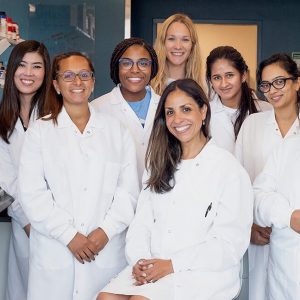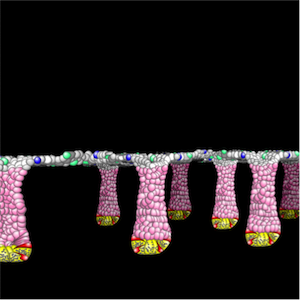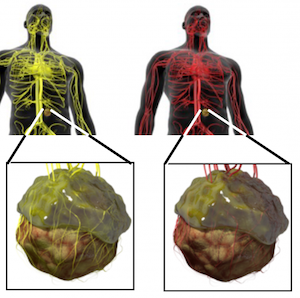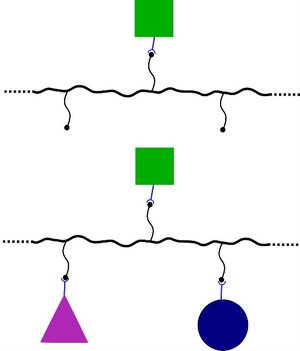
The Joint Department offers a Ph.D. in Biomedical Engineering with an emphasis on Pharmacoengineering, an emerging discipline that integrates engineering methods with pharmaceutical sciences.
Pharmacoengineers apply the latest experimental approaches from life sciences, chemistry and physics in conjunction with theoretical and quantitative methods from engineering, mathematics and computer science to solve problems in medicine and drug therapies. Our program — a joint effort between the Eshelman School of Pharmacy Division of Molecular Pharmaceutics and the Joint Department of Biomedical Engineering at UNC-Chapel Hill and North Carolina State University — prepares students to work at the interface of engineering and pharmaceutical sciences to develop safer and more effective medicine and medical technologies.
Note: Prospective students can apply to this program through either the Joint Department of Biomedical Engineering or the UNC Eshelman School of Pharmacy’s standard application websites. Upon completing their studies, they will receive a Ph.D. from the program to which they applied.
Career Outlook
There is growing interest and need worldwide for PhDs at the cutting edge of this exciting discipline in academic institutions as well as the biomedical, biotechnology and pharmaceutical industries. Data from the American Association of Pharmaceutical Scientists, the primary national organization for the pharmaceutical sciences, indicate that at least three thousand positions exist for scientists with a Ph.D. in the subspecialties represented by pharmacoengineering, and the demand for such scientists and engineers are rapidly expanding. In addition, graduates from the Division of Molecular Pharmaceutics have traditionally been highly sought after — primarily by industry — and often receive offers of employment well in advance of finishing their degree.
What Our Program Offers
 Our program is among the first of its kind in the country. It not only provides students with a strong knowledge base in both pharmaceutical sciences and engineering but also a highly interdisciplinary research experience. Students have the flexibility to work with any of more than two dozen outstanding faculty members with expertise in a variety of fields within pharmacy and engineering.
Our program is among the first of its kind in the country. It not only provides students with a strong knowledge base in both pharmaceutical sciences and engineering but also a highly interdisciplinary research experience. Students have the flexibility to work with any of more than two dozen outstanding faculty members with expertise in a variety of fields within pharmacy and engineering.
Our proximity to the Research Triangle Park offers ample research collaboration and employment opportunities for our students. Many of the research projects undertaken by students are highly collaborative, often involving joint work between pharmacy and engineering faculty and colleagues at the UNC School of Medicine, the UNC Department of Chemistry or one of the many pharmaceutical companies and institutions in the RTP, such as GlaxoSmithKline, the U.S. Environmental Protection Agency, the National Institute of Environmental Health Sciences and the Chemical Industry Institute of Toxicology.
BME-based Pharmacoengineering Labs

Benhabbour Lab
Dr. Benhabbour’s laboratory is in the UNC-Eshelman School of Pharmacy at the Division of Molecular Pharmaceutics and is part of the Center in Nanotechnology and Drug Delivery (CNDD). Our lab collaborates with experts in the fields of oncology and HIV research both at the basic research and clinical sides. Our goal is to develop new devices and technologies that can be translated from the bench side to the bedside and impact human health.
Visit the Benhabbour Lab website…
Gomez Lab
The Gomez Lab is primarily a bioinformatics and computational modeling group. Its research focuses on the study of biological processes from an integrated, or systems viewpoint – commonly referred to as Systems Biology. The group is particularly interested in better understanding the “wiring” of biological systems and the discovery of underlying principles in biological organization.
Visit the Gomez Lab website…
Molecular Pharmacoengineering Lab
The Brudno lab focuses on exploiting cutting edge chemical, biomaterial and nanomedicine technologies to understand physiological responses during disease and regeneration and fulfill critical unmet needs in the clinic. Our group studies controlled drug delivery, bio-inspired materials and nanomedicine, with a focus on cancer chemotherapy and immunotherapy.
Visit the Molecular Pharmacoengineering Lab website…
Zaharoff Lab
The Zaharoff Lab focuses on the development of innovative, translatable vaccine and immunotherapy delivery platforms that will have high clinical impact in an immediate timeframe. Our multidisciplinary research program utilizes the engineering design process to develop novel biomaterials-based strategies for localized immunotherapy delivery.
Visit the Zaharoff Lab website…

